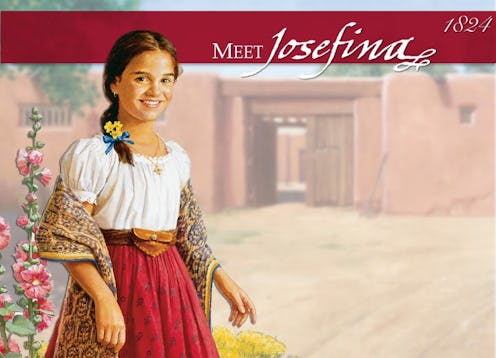Books
The 'American Girl' Books Were Lessons In Resistance

If you've ever been a girl in America, chances are you've probably run across at least one American Girl. There were the American Girl Dolls, of course, which managed to actually look like chubby little girls and not like starved praying mantis women. But really, it was all about the American Girl books (and the tiny dolls that you could buy for the dolls). Even if you never owned a doll or managed to steal one from your neighbor, you probably came across those books. The titular girls each encompassed a different historic period in American history, and each one managed to be that perfect blend of educational and real. Here are a few reasons why the American Girl books are still relevant, even today.
I mean, for a lot of kids, those books helped us to understand American history a lot better than history class ever did. And American history is all too relevant to the American present. Half of our country wants to return to America's "great" past... but when, exactly? How great was it? And for whom?
These series of doll-based historical books from the '90s may not be able to answer every question we have about the current political landscape of America, but these historical girls are still more relevant now than ever:
1Felicity was all about nonviolent resistance
Felicity lived during the Revolutionary War, and being a little girl didn't stop her from sticking it to British imperialism. In one famous scene, Felicity turns over her tea cup and announces, "I shall take no tea," to protest British taxes. Felicity knew that taxation without representation was some serious B.S. She's also a spunky, redheaded role model for anyone looking for ways to resist political injustice in everyday life. Don't drink tea that you don't agree with just to be polite.
2Samantha used her privilege for good
Victorian Era Samantha honestly didn't have that many personal problems (except for maybe being a rich orphan). But her wealth and privilege didn't stop her from standing the hell up for worker's rights. She uses her position to argue that the family seamstress shouldn't be fired for having a baby, and that her BFF Nellie shouldn't have to work in a factory as a freaking nine-year-old. Sure, it usually takes her a few chapters to understand that poor people can't just buy more money, but once she gets it, Samantha is all about economic justice.
3Molly affected change from the homefront
Molly was kicking it in the '40s, while her father was overseas as a medic in WWII. These books were almost a little creepy, because Molly was dealing with typical preteen drama like curling her hair, while the Holocaust was going on one ocean away. But Molly was also pretty good at balancing the minutiae of her normal life with an awareness of what was going on in the world. She didn't normalize war, and she made every effort to affect change and improve morale at home.
4Josefina was cool with nontraditional families
Josefina lost her mother before book one, so the series mostly focuses on her creating a new family with her father, sisters, and aunt (and then her dad and her aunt get married in the last book and it's adorable). Dads marrying aunts wasn't quite as weird in the 1820s, but Josefina still reminds us that there's no right or wrong way to make a family, no matter the decade.
5Kit didn't stand for fake news
Kit was a budding journalist, growing up in the Great Depression. She was all about factual reporting, even when she had to face up to unfortunate economic reality. Kit knew that the only way to get through tough times is to face up to the truth, no matter how unpleasant, and to stay informed. This book also got pretty darn real about unemployment and the collapse of the American Dream (spoiler alert: sometimes hard work isn't enough to keep your job).
6Addy constantly questioned the status quo
Everyone... just re-read Meet Addy. That book gets pretty real about the atrocities of slavery, as far as children's books go (Addy watches her father and brother get sold and is forced to eat worms). Addy constantly questions the status quo. Her books are a forceful reminder that the institution of slavery was perfectly legal in the recent history of the United States. She taught us all to keep questioning authority, to resist injustice forcefully, and to remember that what is legal is not always what is right.
7Kirsten was a tough as hell immigrant
Unlike the other American Girls, Kirsten's story starts with her arriving in America. She doesn't speak English, her BFF straight up dies of cholera, and she has to go live in a house made of logs. Her story may not be exactly like the modern immigrant experience, but the trials Kirsten must pass through to arrive safely in America are all too relevant today. Plus, Kirsten is a good reminder that very nearly everyone who lives in America today is descended from immigrants who had to watch their BFFs die of cholera.
8Kaya had to take responsibility for her actions
Kaya was always forgetting to watch her little brothers, or letting her sister get kidnapped or something. In the beginning of book one, all the kids are punished for something that Kaya did, setting the precedent that her actions affect everyone. Kaya's story follows her on a bunch of bad ass adventures with her horse and her dog, but she also learns to take responsibility for her actions over the course of the series, because the actions of the once can affect the many.